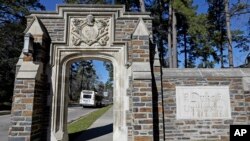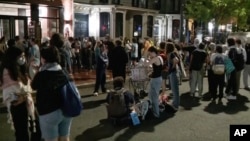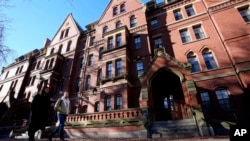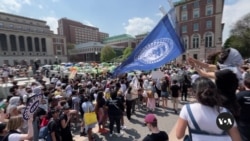Student Union
Scholarships Help Refugees Finance Higher Education
Nevfel Akkasoglu was arrested and imprisoned for 14 months during the attempted Turkish military coup d’état in 2016 for being associated with a university the Turkish government had shut down.
Akkasoglu eventually made his way to New York’s Columbia University, where a new scholarship allows him to live and study without fear or worry over how to finance his education.
“This is really important for me to pursue my dreams in returning to my original profession, as being a lawyer, in the United States. I believe it would be really hard to pursue a master’s degree without that scholarship,” said Akkasoglu, a candidate for a Master of Laws (LL.M) degree in data privacy and cybersecurity at Columbia Law School.
Akkasoglu and his wife have asylum in the U.S.
“Being approved told me that our story, the things that I experienced in Turkey, the grave situations, really mattered. It told me that there is still hope, there is still hope in life. You should continue to pursue your dreams no matter what, and you should never give up,” said Akkasoglu.
His scholarship at Columbia is new and unusual. The Ivy League school offers full scholarships every year for refugees and other displaced students.
The Columbia University Scholarship for Displaced Students (CUSDS) was launched in December 2019. It is the first-ever Columbia-wide scholarship and the world’s first of its kind, according to the school’s website.
“I’m very grateful that I got the scholarship,” said Shabnam Fayyaz, a CUSDS recipient. Born in Afghanistan in 1996, the year the Taliban came to power, Fayyaz and her family fled first to Pakistan.
“I’m learning a lot. For every reading, I’m like, ‘Woah, this is what I really want to do.’ It’s like a dream that I’m fulfilling through this scholarship that I have and through this master’s human rights studies that I’m doing at Columbia,” said Fayyaz.
“Having this scholarship and doing this master’s, I’m discovering that I’m very interested in doing a PhD in human rights or going to law school to help immigrants and refugees in the future, especially women, coming from countries like Afghanistan and Pakistan,” she added.
Fayyaz is pursuing her master’s degree in human rights with a focus on refugee rights and women’s rights. She applied for asylum in 2019, and her case is pending.
Administered by the Columbia Global Centers, which are research outposts established by the university in nine international locations, CUSDS commits up to $6 million in scholarship money for up to 30 students.
The scholarship covers the students’ tuition, housing and living assistance while they pursue undergraduate or graduate degrees across all 18 of Columbia’s schools and affiliates.
Recipients will also reap mentoring benefits from the schools and student groups.
“[This scholarship] means hope. And despite all the challenges we have currently in the world, we can still make a change when you provide skilled people, who have the potential to change the world, then we are still in a good place,” said Sami Salloum, originally from Damascus, Syria, and a CUSDS recipient.
Salloum is a master’s student focusing on negotiation and conflict resolution. Before attending Columbia, Salloum interned with the United Nations Security Council. His case seeking asylum is pending.
“If other universities follow the pioneering experience that Columbia has launched, we’ll be in a good place where millions of children and youth who have been deprived from their education can join and prove themselves, and improve the circumstances of their communities,” Salloum added.
As of 2019, the United Nations Refugee Agency (UNHCR) reported that there were nearly 80 million displaced people around the world as a result of persecution, conflict, violence or human rights violations.
Columbia University is accepting applications for its second class of CUSDS recipients. Those seeking to apply must be foreign nationals with refugee status or who have received U.S. asylum, submitted an asylum application, be in the U.S. under Temporary Protected Status, or be classified as internally displaced persons. Those who are eligible may apply from anywhere in the world. There are no age restrictions and students are accepted on a rolling basis.
Applicants must apply to and be accepted by one of the degree programs listed on the website to be eligible for the CUSDS. Acceptance requirements and application deadlines differ depending on the school and degree program.
For the 2020-21 academic year, 18 students from 13 countries were selected from a competitive pool of more than 1,200 applicants.
“These students have been through traumatic experiences and they are determined to not let that stand in the way of them being able to pursue their dreams,” said Safwan Masri, the executive vice president for Columbia’s Global Centers and Global Development.
He added, “For us, at Columbia, to be able to provide them that opportunity that they otherwise would not have had, to get a full ride and pursue their studies, feels incredibly powerful.”
See all News Updates of the Day
- By VOA News
Students weigh in on how colleges can prepare undergrads for work

Inside Higher Ed surveyed undergraduates on the best way to prepare for the workforce.
One group of students in Oregon built a for-profit snowboarding business as part of their degree. Colleen Flaherty reports. (April 2024)
- By VOA News
Many African students are experiencing US visa rejections

In 2022, 71% of student visa applications from Western Africa were rejected.
Visa agents are not happy – and are finding ways to help applicants with paperwork and the interview. Maina Wururu reports for The PIE News. (April 2024)
- By Tina Trinh
US college students face muted graduations amid Gaza war protests
Commencement ceremonies are being scaled back or canceled at U.S. universities because of security concerns over pro-Palestinian student protests. While some campus demonstrations have resulted in concessions, others have led to violent confrontations. VOA’s Tina Trinh has the story from New York.
- By Melos Ambaye
Police arrest 33 at George Washington University protest encampment

Police in Washington cleared a pro-Palestinian protest encampment at George Washington University early Wednesday, arresting 33 people, authorities said.
Arrests were made on charges of assault on a police officer and unlawful entry, the District of Columbia's Metropolitan Police Department said.
A congressional committee canceled a hearing on the university encampment Wednesday. D.C. Mayor Muriel Bowser and Washington Police Chief Pamela Smith had been scheduled to testify about the city’s handling of the protest before the House Committee on Oversight and Accountability.
University parents and faculty members gathered Wednesday afternoon for a press conference to condemn the handling of the protests by police and school leaders.
“The university clearly does not value the students at all and has endangered the safety of our children by unleashing officers dressed in full riot gear to assault and spray our children in their eyes with pepper spray,” said Hala Amer, whose son participated in the campus protests.
Police said they dispersed demonstrators because "there has been a gradual escalation in the volatility of the protest."
American University professor Barbara Wien said she stayed in the encampment with GW students. She described the student protesters as democratic and peaceful.
Police started to shut down the tent encampment after dozens of protesters marched to GW President Ellen Granberg's on-campus home on Tuesday night. Police were called, but no arrests were made.
Speakers at the conference called for Granberg’s resignation because, they alleged, she refused to meet and negotiate with student protesters.
“You keep inciting violence and ignoring the students,” Amer said about Granberg in an interview with VOA after the conference. “It will just lead to more violence. You need to talk to your students.”
GW officials warned students that they could be suspended for engaging in protests at the school’s University Yard, an outdoor spot on the campus.
"While the university is committed to protecting students' rights to free expression, the encampment had evolved into an unlawful activity, with participants in direct violation of multiple university policies and city regulations," a GW statement said.
More than 2,600 people have been arrested at universities across the country in pro-Palestinian protests, according to The Associated Press.
Students are calling on their university administrations to divest investments from Israel or companies with ties to Israel. Demonstrators have gathered in at least 50 campuses since April 17, carrying signs that read "Free Palestine" and "Hands off Rafah."
Rafah is Gaza’s southernmost city, where most of the territory’s population has clustered. The area is also a corridor for bringing humanitarian aid into the Palestinian territory.
Israel seized the Gaza side of the Rafah crossing on Tuesday, while shutting off the nearby Kerem Shalom crossing, drawing criticism from humanitarian groups. Israel said Wednesday that it had reopened Kerem Shalom.
The nationwide campus protests started in response to Israel's offensive in Gaza that began after Hamas launched a terror attack on Israel on October 7, killing about 1,200 people and taking roughly 250 hostages.
More than 34,000 Palestinians have been killed in Israel's offensive, according to the Gaza Health Ministry. Israel warned it could "deepen" its operation in Rafah if talks failed to secure the release of the hostages.
Some information for this report came from The Associated Press.
- By VOA News
What to ask on a college visit

Sarah Wood lists 32 questions for applicants to learn more during a campus visit. (April 2024)










